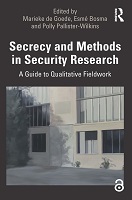Secrecy and Methods in Security Research
Proposal review
A Guide to Qualitative Fieldwork

Contributor(s)
De Goede, Marieke (editor)
Bosma, Esmé (editor)
Pallister-Wilkins, Polly (editor)
Language
EnglishAbstract
This book analyses the challenges of secrecy in security research, and develops a set of methods to navigate, encircle and work with secrecy.
How can researchers navigate secrecy in their fieldwork, when they encounter confidential material, closed-off quarters or bureaucratic rebuffs? This is a particular challenge for researchers in the security field, which is by nature secretive and difficult to access. This book creatively assesses and analyses the ways in which secrecies operate in security research. The collection sets out new understandings of secrecy, and shows how secrecy itself can be made productive to research analysis. It offers students, PhD researchers and senior scholars a rich toolkit of methods and best-practice examples for ethically appropriate ways of navigating secrecy. It pays attention to the balance between confidentiality, and academic freedom and integrity. The chapters draw on the rich qualitative fieldwork experiences of the contributors, who did research at a diversity of sites, for example at a former atomic weapons research facility, inside deportation units, in conflict zones, in everyday security landscapes, in virtual spaces and at borders, bureaucracies and banks.
The book will be of interest to students of research methods, critical security studies and International Relations in general.
Keywords
security research; security; guide; fieldworkISBN
9780367027247Publisher
Taylor & FrancisPublisher website
https://taylorandfrancis.com/Publication date and place
2019Imprint
RoutledgeClassification
Central / national / federal government policies
